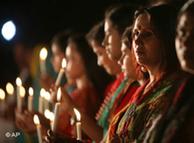Women’s rights groups slam Dhaka’s inaction
 One year after the Bangladesh Supreme Court issued an order criticizing the government for failing to protect it citizens, there has not been a great deal of change, criticize women’s rights groups.
One year after the Bangladesh Supreme Court issued an order criticizing the government for failing to protect it citizens, there has not been a great deal of change, criticize women’s rights groups.
Last year in January, Hena Akhter, an adolescent Bangladeshi girl, received 100 lashes for an alleged affair with a married man. It had been ordered by a “shalish,” a makeshift village court, in Shariatpur district in the Dhaka Division. Six days later, the 14-year-old died in hospital. Before her punishment she had reported that she had been sexually abused.
![]() read more
read more
Rape victims or war heroes: war women in Bangladesh
 Hundreds of thousands of women were raped during the Bangladesh Liberation War in 1971. As the country celebrates 40 years of independence, these victims of war, known as Birangonas, continue to suffer.
Hundreds of thousands of women were raped during the Bangladesh Liberation War in 1971. As the country celebrates 40 years of independence, these victims of war, known as Birangonas, continue to suffer.
In Bengali, the word Birangona means “brave woman.” The Bangladeshi government gave this title to women who were raped by the Pakistani army in the nine months of the Liberation War of 1971. But the title has come to mean “dishonored” or “violated woman” and is synonymous with rape, abortion, suicide and war. According to Bangladeshi freedom fighters, the Pakistani army raped over 200,000 women during the war. Many of them migrated
![]() read more
read more
Rajasthan introduces sterilization incentive scheme
 A steady stream of women who have already had children are keeping Rajasthan’s government hospitals in a tube-tying whirl after authorities came out with a plan to help slow the baby boom.
A steady stream of women who have already had children are keeping Rajasthan’s government hospitals in a tube-tying whirl after authorities came out with a plan to help slow the baby boom.
Kavita Devi could not believe her luck when the local health authorities decided to award her a 21-inch color television. The 25-year-old lives in the Barmer district of Rajasthan – India’s biggest state and home to 68 million people.
The mother of two boys won the lucky draw after she opted for sterilization in September. “I am so happy. I am now going to tell my friends not to have more children. I understand that population
![]() read more
read more
Young Pakistani girls learn to speak up for their rights
 For many Pakistani women, talking about gender issues is not easy The Leadership for Environment and Development Pakistan has organized a workshop to promote gender equality and say that the involvement of men in gender discourse is crucial to end violence against women in Pakistan.
For many Pakistani women, talking about gender issues is not easy The Leadership for Environment and Development Pakistan has organized a workshop to promote gender equality and say that the involvement of men in gender discourse is crucial to end violence against women in Pakistan.
Noor Bano, a 16-year-old resident of Malangabad, a remote village in the Khairpur district of the Sindh province, believes that convincing men to treat women as equals is a Herculean task. Despite that, Bano is of the opinion that men should be involved in the
![]() read more
read more
‘Let me enjoy my rights as gays do’
Wearing a headscarf is a personal decision for many Muslim women, but where does one draw the line between being forced to follow a tradition and asserting one’s own identity?
“There are so many gays, for example, and people tell them that they should be more open about their feelings, but if someone comes along and says ‘we want to show our religion,’ everybody is against it.” This is Sarah Benkhera’s answer to a question about the ban on headscarves imposed in France and some other European countries a few years ago. She is a German of Algerian origin and wears a “khimar”, a kind of cloak that covers her head and goes all the way down to her waist.
Sarah is accompanied by her friends, women in their early twenties, who are dressed in ordinary jeans and pullovers, in stark contrast to Sarah’s long black robes. They are quite
![]() read more
read more









Feedback